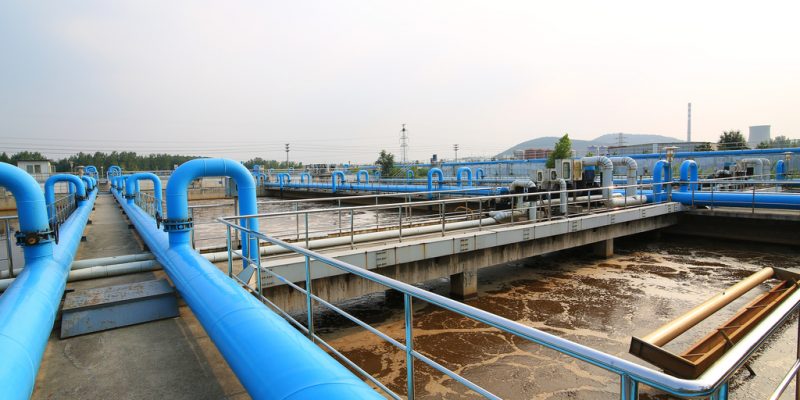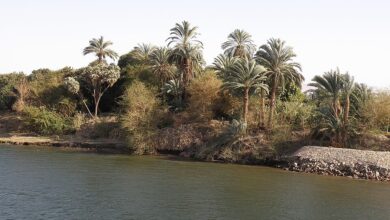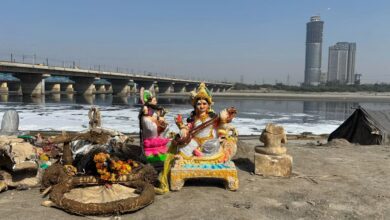Modern science tells us that our resources are not infinite. Nevertheless, the notion of securing the world’s fresh-water supply has disappeared from global discussions about the environment.
In November, the water issue was removed from the text used by international leaders to negotiate an agreement on mitigating the effects of climate change. Water, therefore, is not among the topics being discussed at the ongoing Copenhagen climate summit.
Throughout history, wars have been fought over water. Today, more than a billion people lack access to clean water. With melting icecaps, rising ocean and sea levels and the possibility of catastrophic events such as floods, future conflicts could very well be triggered by water-related issues.
What the ancients knew appears to elude today’s world leaders. The ankh, or key of life, was the symbol of the Nile–a blessing of fresh water bestowed upon Egyptians.
Most of today’s climate change activists agree that humans will not be able to fully reverse the phenomenon’s effects. Nevertheless, we can take steps to reduce–and prepare for–the consequences.
In Egypt, this primarily relates to securing the country’s fresh water supply.
"Whatever there is in the form of water uses, let’s use them productively," said Paul Weber, irrigation agronomist at the Agriculture Ministry. Weber, who also works in the GTZ-Cairo office (which liaises between the Egyptian and German governments), says the focus in the past was to increase the amount of water available to match the needs of the country. But since the population has swelled as the amount of arable land has dwindled, preserving what’s available has become a priority.
"The priority in Egyptian agrarian and water policy does not focus anymore on the absolute increase of production without considering the limitation of water and soil resources," Weber wrote in his 2007 book, "Is Egypt facing a water crisis?" "It rather has to be directed toward an increase of water productivity."
According to Weber, of the 13 billion cubic meters that flow into the Mediterranean Sea from the Nile River each year, about five billion could be used to increase the country’s water supply.
Another scientist, however, ruled out this option due to its potential environmental impact. Ahmed el-Beheiry of the Cairo-based Agricultural Research Center warned of the potentially adverse effects on Mediterranean fishing and farming on the North Coast. "Consider the ecosystem," he said.
To efficiently manage Egypt’s water resources, the main challenge relates to agriculture, which accounts for the lion’s share of the country’s water usage. Farms use roughly 25 times the amount of water–some 38.5 billion cubic meters per year–as consumers and industries combined, according to government figures.
Between the Aswan High Dam and the Mediterranean, Egypt loses water at almost every step: in conveyance, distribution, application and evaporation. Weber estimates that 2.4 billion cubic meters of water is lost each year due to "non-productive evaporation" alone. "Other countries would be happy to have this for their total amount of water," he said.
Discussions about water conservation often revolve around the different types of crops grown in Egypt, such as rice and sugar cane–both of which require relatively large amounts of water. Both are also recognized worldwide as "strategic crops." If Egypt switched to less water-intensive crops like fruits and vegetables–which nevertheless fetch high prices on export markets–the country would become more dependent on agricultural surplus countries for its strategic crops. Egypt already relies on imports of wheat and edible oils, as well as cattle.
Increasing production of tomatoes and strawberries, for example, is risky for a few reasons. If global supplies of rice and sugar drop, or if demand increases, Egypt will have to pay more to import it. If European markets demand less fruits and vegetables in the winter, Egypt could be stuck with a stock of perishable goods–and less money to import necessities like rice and sugar.
Weber proposes that the government revamp its system of distribution. His plan takes distribution from government controlled pumping stations and puts it in the hands of water-user associations comprised of local committees of farmers. Weber argues the latter would more efficiency distribute water and conduct maintenance on their equipment with the right economic incentives.
Organizations such as USAID, the World Bank and GTZ have lobbied the Egyptian government for several years to amend Law 12/1984 to allow water-user associations to control distribution. The law is controversial, he says, because it risks giving too much power to local organizations. "Hundreds of groups, thousands of feddans–that’s a small town," he said. "There is power–people’s power."
The idea also touches on the politically sensitive issue of the privatization of agriculture. By handing over control of water distribution and subcontracting work to local organizations, the government is effectively privatizing water on farmland.
Unfortunately, there is no panacea to Egypt’s water usage problems. Some development organizations have urged farmers to use drip irrigation instead of flooding, but this has only proven successful at a micro level.
Scientists believe that Egypt’s water supply is already showing signs of being affected by climate change. The Delta is sinking at a rate of three millimeters per year, while Weber estimates that the Mediterranean is rising by one centimeter annually. This could eventually destroy much Delta farmland, displace some 20 million people and ruin the country’s food supply.
For this reason, environmental experts and activists are urging Egypt to take steps to preserve its water now–before it runs out.
"I don’t believe there’s a lot we can do to stop the sea level from rising," Mohamed el-Raey, chairman of the Environment Committee at the Supreme Council of Egyptian Universities, told Al-Masry Al-Youm. "What we can do is start using our resources more efficiently and begin investing in new technologies."
"Adaptation means that everyone, especially governments, should act now," he added.




